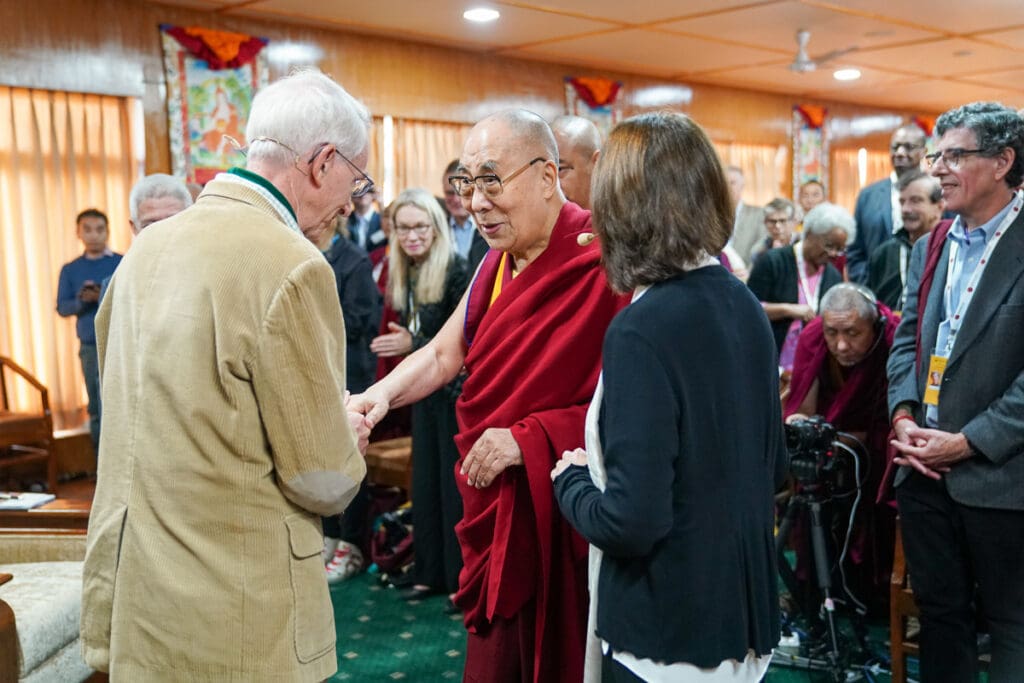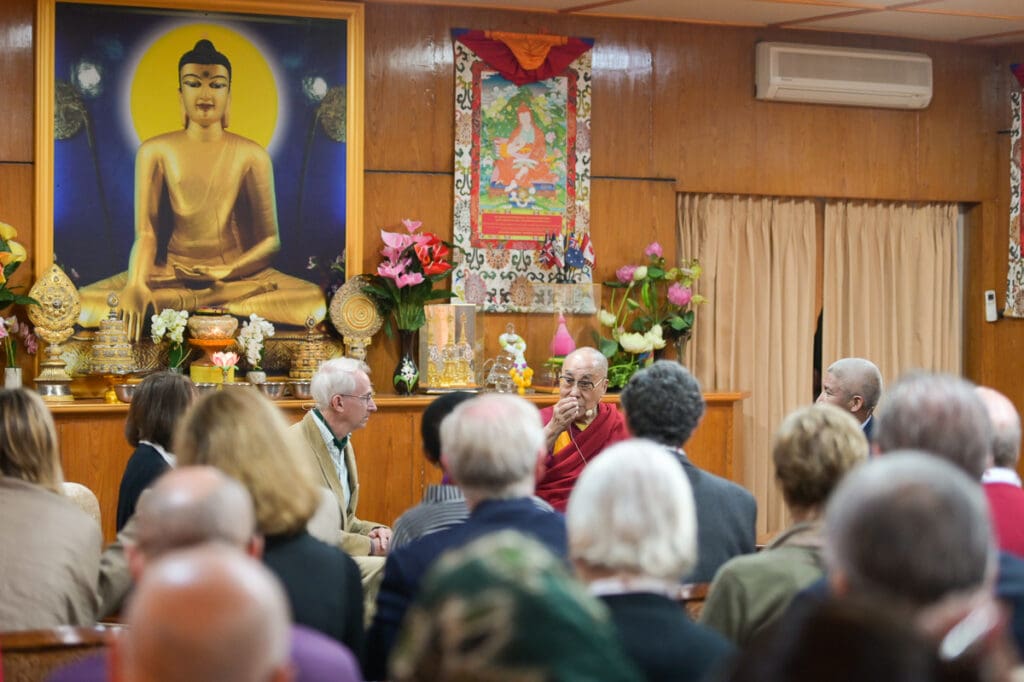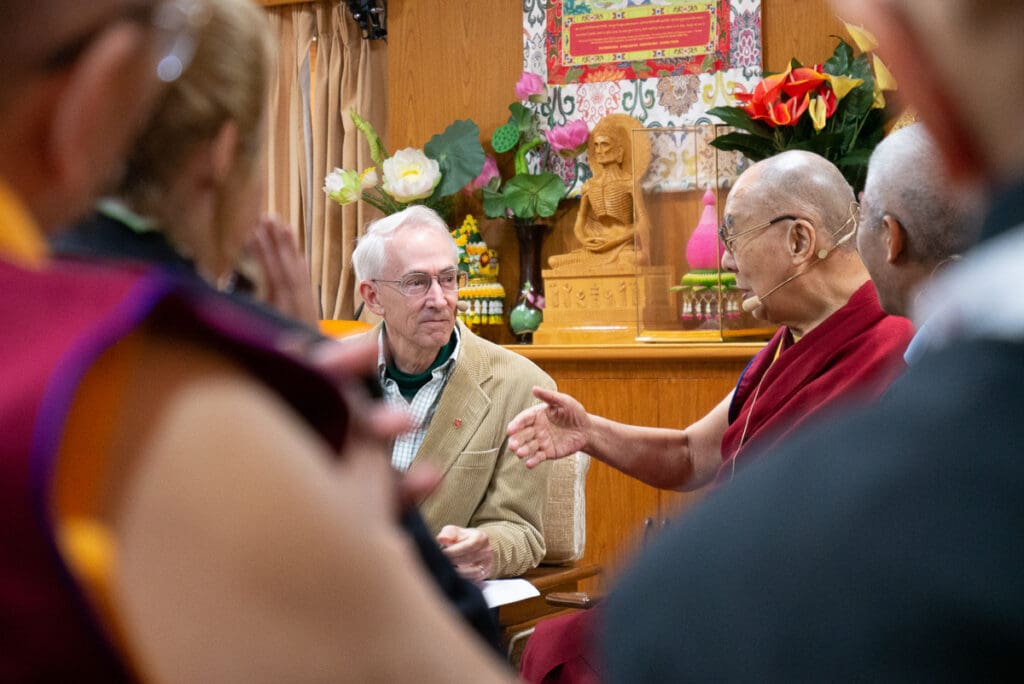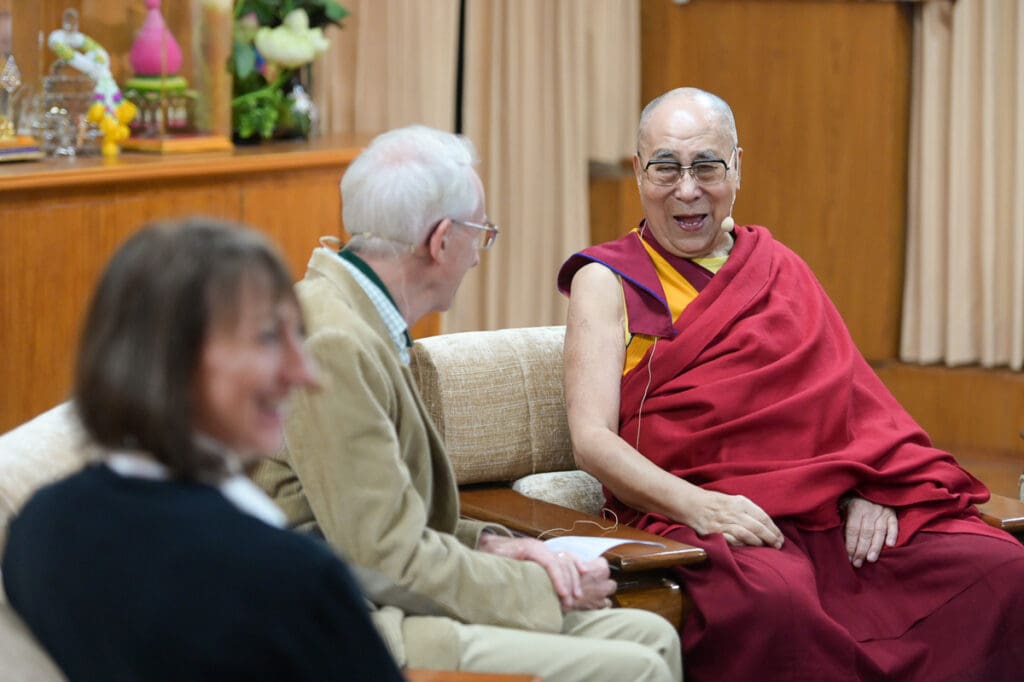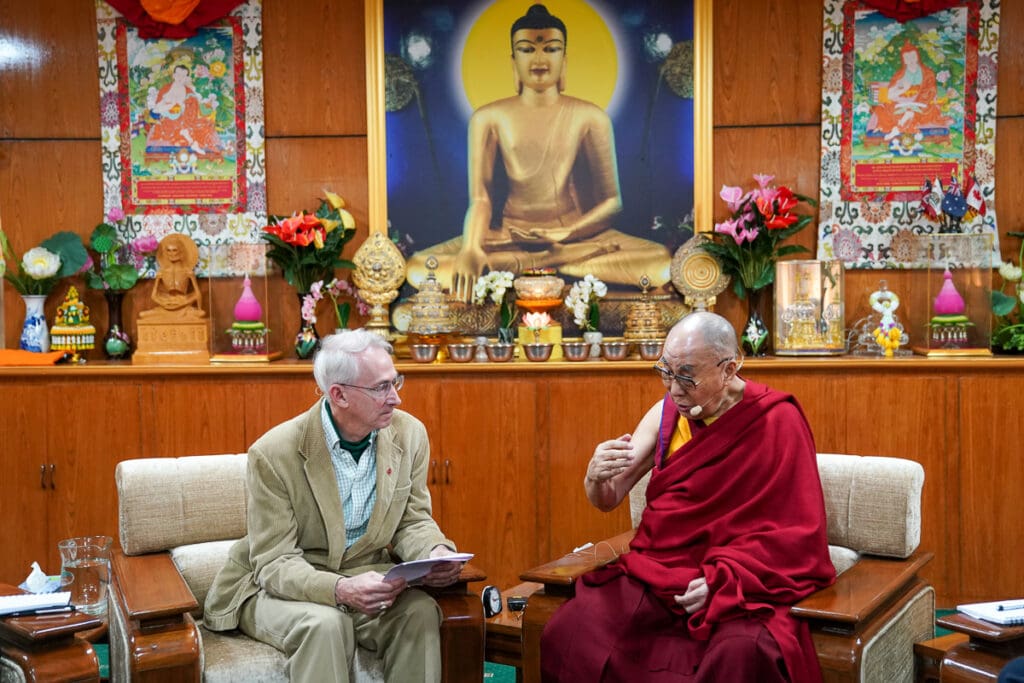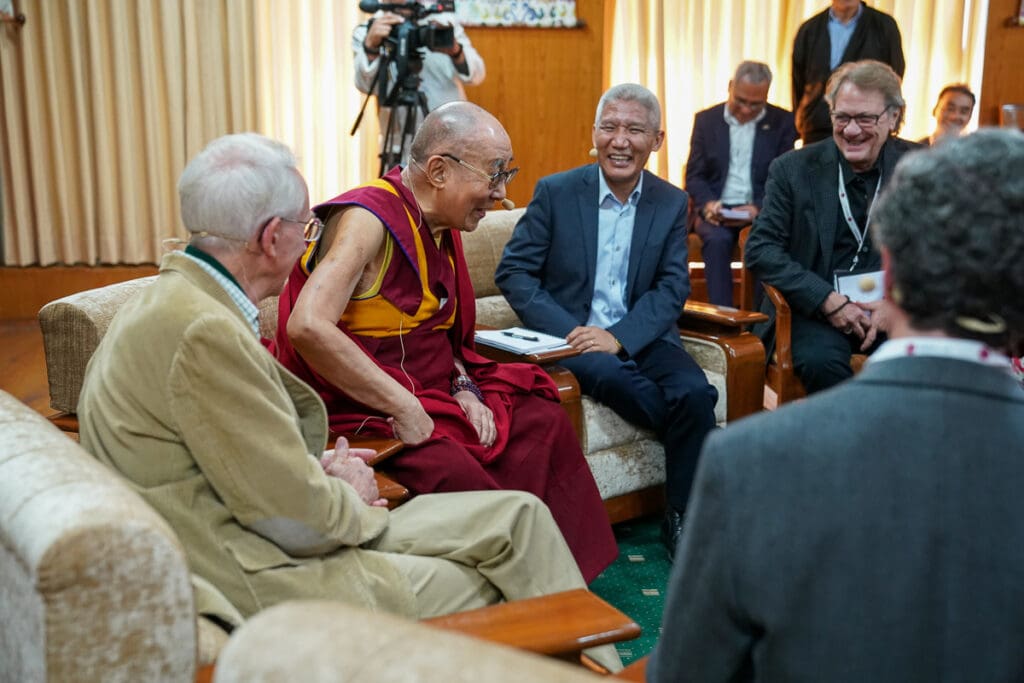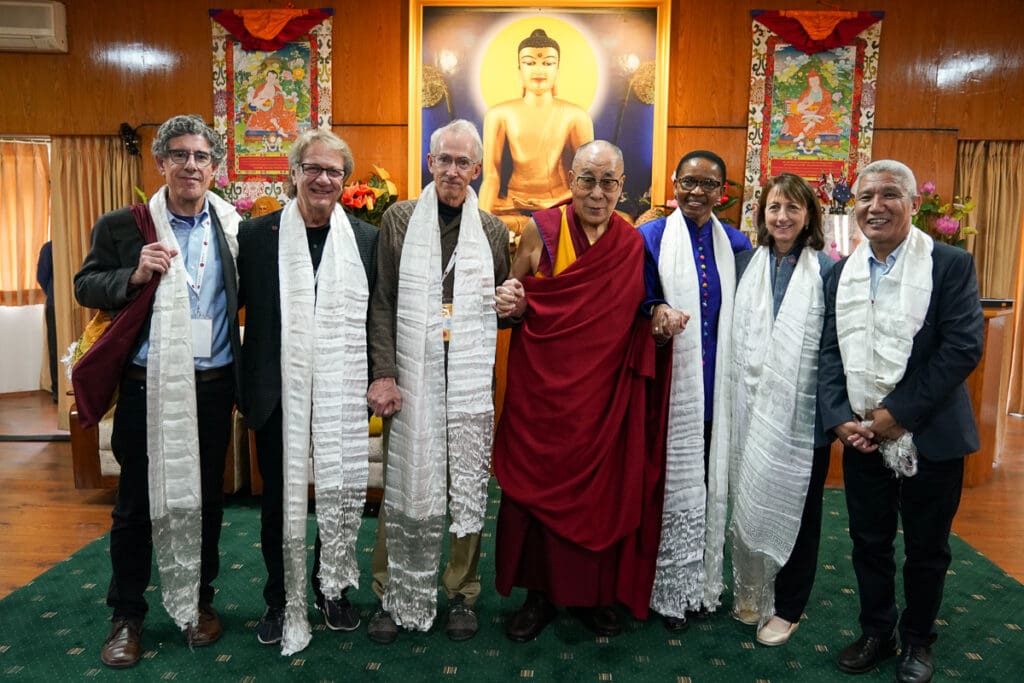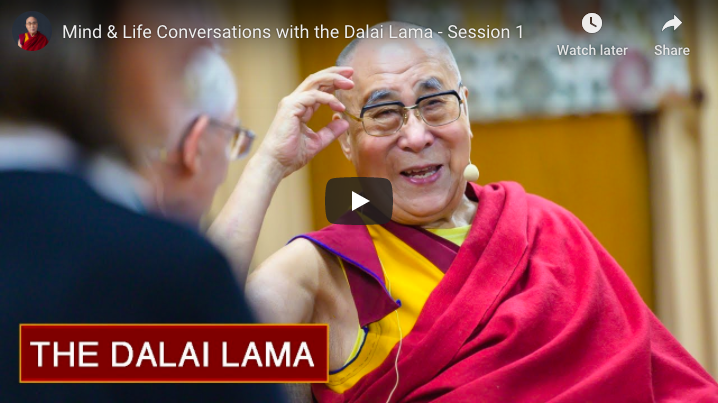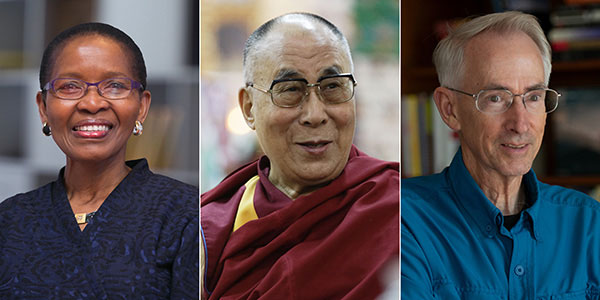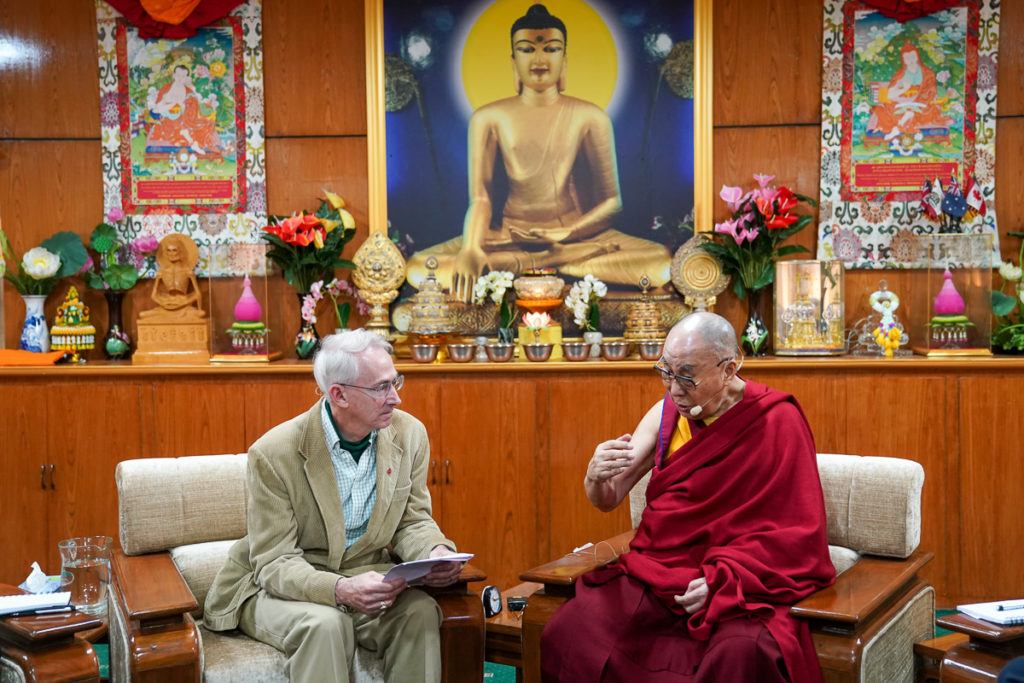
This is the second of two blog posts describing recent Mind & Life Conversations with the Dalai Lama and prominent thought leaders on the topic of “Compassion, Interconnection, and Transformation.” Photos by Phil Walker and Tenzin Choejor.
At a time of sweeping change and daunting global challenges, what’s needed is a whole world ethic to unite people in pursuit of the collective good. On this, both the Dalai Lama and evolutionary scientist David Sloan Wilson agree. In a recent two-hour dialogue, Wilson informed the Dalai Lama of a paradigm shift in evolutionary science and the role that conscious evolution can play in achieving their shared vision.
Sponsored by the Mind & Life Institute, their conversation on the theme of “Compassion, Interconnection, and Transformation” bridged science and contemplative wisdom, offering insights both practical and profound.
“This theme is really central to our work right now,” said Mind & Life President Susan Bauer-Wu in welcoming in-person guests and an online audience spanning 60-plus countries. “Pretty much all of our programs and grants are lifting up this theme of interconnectedness and societal transformation.”
Many of today’s problems—violent conflicts, global warming, the growing gap between rich and poor—are actually our own creation, commented the Dalai Lama in his opening remarks, adding “there is too much stress on differences between ‘us’ and ‘them.’”
“There is too much stress on differences between ‘us’ and ‘them.’”
— The Dalai Lama
“As human beings, we have the responsibility to reduce, if not eliminate such problems” he added, emphasizing that humans are by nature “social animals,” with individual survival dependent on the community. Basic human nature is compassionate and “that’s a really hopeful sign,” he said, while cautioning against self-centeredness.
Wilson, Distinguished Professor of Biology and Anthropology at Binghamton University and President of the Evolution Institute, has spent years exploring how the basic human drive toward goodness can be consciously nurtured to create a better future for both people and the planet. He commended the Dalai Lama’s call for “an ethics for the whole world” that unites “citizens of the earth regardless of our other identities.”
Wilson described a sea change that has occurred in evolutionary science over the last 50 years. Previously, evolutionary theory was limited to the study of genetic evolution, he explained. “Everything that evolved by evolution was said to be selfish, a form of self-interest. Anything called true altruism, true compassion, was thought not to evolve at all.”
“Thankfully things have changed,” he added, and the three core ingredients that describe evolution—variation, selection, and replication— “can actually describe cultural change and personal change. Altruism, compassion, everything we associate with goodness can evolve as a product of evolution.”
“Altruism, compassion, everything we associate with goodness can evolve as a product of evolution.”
— David Sloan Wilson
Furthermore, evolution can be a conscious process that humans can—and must—guide to achieve an ethics for the whole world, Wilson emphasized. As described in his recent book, This View of Life: Completing the Darwinian Revolution, qualities like altruism and goodness can evolve as a product of evolution, but only when certain conditions are met.
To illustrate, Wilson described a series of experiments involving chickens. The goal was to determine if humans could intervene in the evolutionary process of chickens to increase their egg laying productivity.
In one experiment, researchers took the most productive hen from a series of cages to breed the next generation. In another, they took the most productive cages of hens to see how breeding these would influence egg laying in the future.
Which group performed best?
As it turned out, productivity declined among the first group of hens. The most productive hen was a bully, who suppressed the egg laying of the other hens, explained Wilson. “After five generations, we had bred a generation of sociopaths.” By contrast, the most productive cages contained the most peaceful hens. “After five generations, we had produced a strain of compassionate hens, who helped each other lay eggs,” he added.
The researchers concluded that egg laying is a social process. “This is not only true for chickens but for the rest of us,” Wilson affirmed. “We are not standalone individuals but nodes in a social process.”
The chicken experiment also revealed that selection at the smallest scale—between individuals within a single group—favors destructive selfishness, because natural selection is based on relative fitness, Wilson explained. By contrast, “if we look at the natural selection of groups that do better than other groups, evolution favors cooperation and altruism within members of those groups.”
A key takeaway for Wilson and colleagues is that humans need to do better job of constructing groups and norms of behavior. Toward that end, the Evolution Institute is applying evolutionary principles at the neighborhood and national level to better understand and improve educational, social, and economic conditions.
In a less than ideal world, Bauer-Wu pressed Wilson on how to discourage self-serving behavior among individuals so that those who are kind and compassionate are not exploited. “All groups are vulnerable to the wolves of selfishness,” he cautioned, emphasizing the need to develop mechanisms of protection and to take measures to promote altruistic behavior.
Through a new book, Prosocial and online platform, Wilson and collaborators are working to help groups—including businesses, schools, and social justice organizations—operate more effectively and harmoniously based on core design principles that reinforce cooperation and collaboration.
The Dalai Lama also stressed the importance of nurturing and assuming individual responsibility. One of the precepts of the Bodhisattva tradition is to stand firmly against injustice, he said, while emphasizing the importance of training the mind to overcome destructive emotions.
Such training needs to begin early in the way children are educated, he affirmed. “Existing education systems are very much oriented around material value. Now the time has come when we must make an effort to educate human beings on the importance of warm heartedness,” he said. Through his writing and public speaking, the Dalai Lama has advocated for an “education of the heart,” calling for teaching children universal values such as kindness, compassion, and altruism, and cultivating an understanding of our shared humanity.
“Education systems are very much oriented around material value.
The time has come when we must make an effort to educate human beings on the importance of warm heartedness.”
— The Dalai Lama
Their shared emphasis on human interconnectedness and the need for a whole world ethic is one of many areas where Wilson, as scientist, and the Dalai Lama, as spiritual leader, found clear alignment.
The key to conscious evolution, Wilson affirmed, is taking meaningful action in pursuit of the collective good. While individualism has been the predominant worldview in recent times, humans need to embrace what he calls an organismic view of human society in which humans consciously collaborate. “We need to imagine our future and then step into that future,” he said, “planning our actions with the whole world in mind.”
To learn more, watch the Mind & Life Conversation between the Dalai Lama and David Sloan Wilson.


